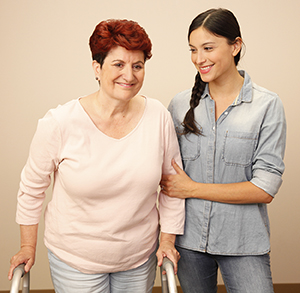Problems with the Senses After Brain Injury
Sometimes an injury damages the part of the brain that controls balance, sight, or hearing. Or memory loss may keep a person from remembering certain sights, sounds, smells, or tastes. Some people have trouble handling abstract ideas, such as time. Or they may simply forget what they are doing from 1 moment to the next.
Problems with sight or sound
If a person is sensitive to light or has double vision, an eye care provider may suggest sunglasses, prescription lenses, or an eye patch. Some people lose vision or hearing on only one side. They may be taught to turn the unaffected side of the body toward the action. If a person has trouble hearing or is confused by background noise, limiting distractions can help.
You can help by doing the following:
Regaining balance
Keeping balance and judging distance are common problems after brain injury. A physical therapist may help a person sit up, stand, or walk. Some people may need to use a wheelchair, walker, or cane.
If the person lives in a multistory home, other changes may be needed. Consider having them stay in a bedroom on the ground floor. Adding bars in the bathroom can help the person stand up safely.
You can help by doing the following:

Dealing with time
Some people can't remember from 1 moment to the next. Others may have trouble planning ahead. Because of this, the rehab team may teach them to check a calendar and clocks throughout each day. People who can read and write are taught to use diaries or daily planners. Each team member may ask the person, “What day is it? What time is it? Where do you need to be next?”
You can help by doing the following:
-
Try to visit at the same time each day.
-
Ask the person which day of the week it is when you arrive.
-
Keep a calendar on the wall. Have the person cross off each passing day.
-
Use the person’s daily planner to note your visits. Write down what you talked about and any decisions reached.
-
Bring in a clock that’s easy to read. A digital display may be best.
-
If the team agrees, get your loved one a watch with an alarm. The alarm can be used to remind the person of meals or rehab sessions.
-
Try to go with the person to important events, such as medical appointments. If this isn't possible, call to remind the person to go to appointments.
-
Use daily pillboxes to organize medicines for the person.
Online Medical Reviewer:
Anne Fetterman RN BSN
Online Medical Reviewer:
Joseph Campellone MD
Online Medical Reviewer:
Raymond Kent Turley BSN MSN RN
Date Last Reviewed:
12/1/2022
© 2000-2024 The StayWell Company, LLC. All rights reserved. This information is not intended as a substitute for professional medical care. Always follow your healthcare professional's instructions.